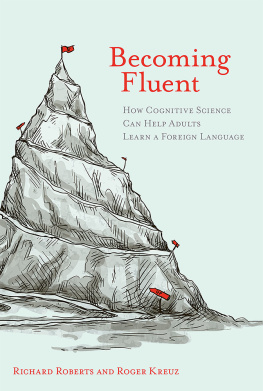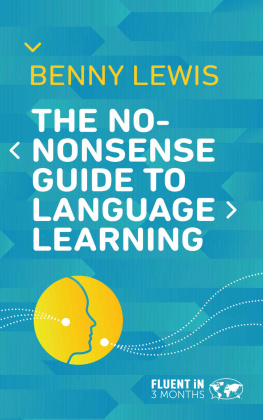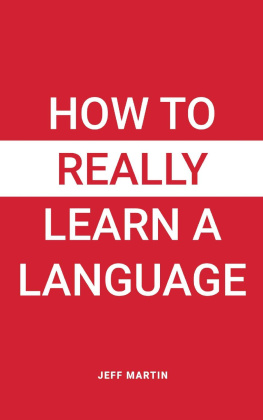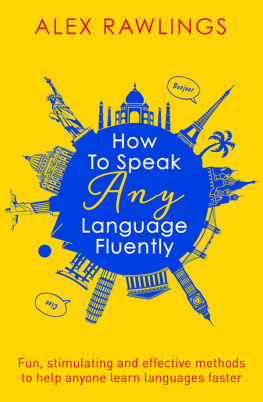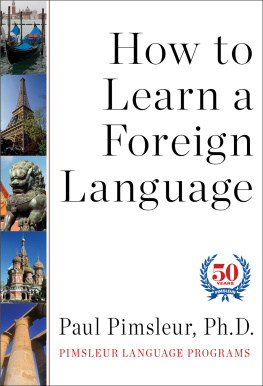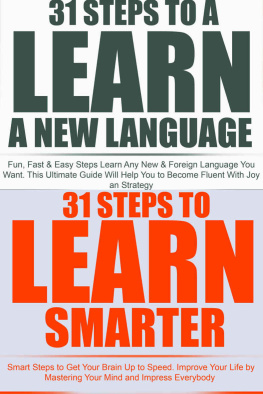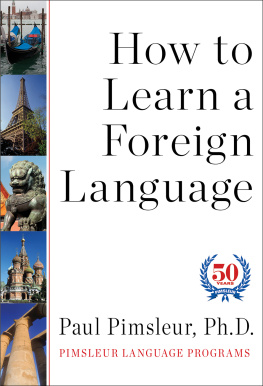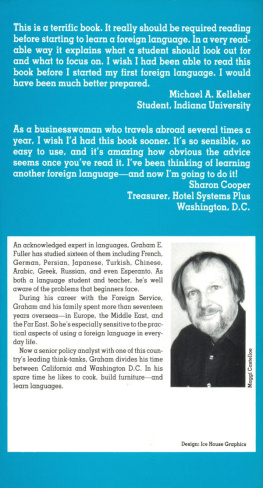Kreuz Roger J. - Becoming fluent: how cognitive science can help adults learn a foreign language
Here you can read online Kreuz Roger J. - Becoming fluent: how cognitive science can help adults learn a foreign language full text of the book (entire story) in english for free. Download pdf and epub, get meaning, cover and reviews about this ebook. City: London;Cambridge, year: 2016;2015, publisher: MIT Press, genre: Children. Description of the work, (preface) as well as reviews are available. Best literature library LitArk.com created for fans of good reading and offers a wide selection of genres:
Romance novel
Science fiction
Adventure
Detective
Science
History
Home and family
Prose
Art
Politics
Computer
Non-fiction
Religion
Business
Children
Humor
Choose a favorite category and find really read worthwhile books. Enjoy immersion in the world of imagination, feel the emotions of the characters or learn something new for yourself, make an fascinating discovery.
- Book:Becoming fluent: how cognitive science can help adults learn a foreign language
- Author:
- Publisher:MIT Press
- Genre:
- Year:2016;2015
- City:London;Cambridge
- Rating:4 / 5
- Favourites:Add to favourites
- Your mark:
- 80
- 1
- 2
- 3
- 4
- 5
Becoming fluent: how cognitive science can help adults learn a foreign language: summary, description and annotation
We offer to read an annotation, description, summary or preface (depends on what the author of the book "Becoming fluent: how cognitive science can help adults learn a foreign language" wrote himself). If you haven't found the necessary information about the book — write in the comments, we will try to find it.
How adult learners can draw upon skills and knowledge honed over a lifetime to master a foreign language.
Kreuz Roger J.: author's other books
Who wrote Becoming fluent: how cognitive science can help adults learn a foreign language? Find out the surname, the name of the author of the book and a list of all author's works by series.
Becoming fluent: how cognitive science can help adults learn a foreign language — read online for free the complete book (whole text) full work
Below is the text of the book, divided by pages. System saving the place of the last page read, allows you to conveniently read the book "Becoming fluent: how cognitive science can help adults learn a foreign language" online for free, without having to search again every time where you left off. Put a bookmark, and you can go to the page where you finished reading at any time.
Font size:
Interval:
Bookmark:
Becoming Fluent
Becoming Fluent
How Cognitive Science Can Help Adults Learn a Foreign Language
Richard Roberts and Roger Kreuz
The MIT Press
Cambridge, Massachusetts
London, England
2015 Massachusetts Institute of Technology
All rights reserved. No part of this book may be reproduced in any form by any electronic or mechanical means (including photocopying, recording, or information storage and retrieval) without permission in writing from the publisher.
Library of Congress Cataloging-in-Publication Data
p. cm.
Includes bibliographical references and index.
ISBN 978-0-262-02923-0 (hardcover : alk. paper)
ISBN 978-0-262-33047-3 (retail e-book)
2014048125
We dedicate this book to our parents:
Michaela Whitaker and Richard Roberts
and Paul and Ila Kreuz
Prologue
Adulthood is the perfect time to expand ones horizons through the study of other languages. All too often, however, the pleasure that should be inherent in learning to speak another language is marred by negative thoughts and experiencespast and present, real and perceived. As a result, we wrote this book for adults of all ages who want to study a foreign language but dont know where to begin.
Growing older confers on adults knowledge and abilities that more than offset any age-related decline. Through this book, we strive to show adult foreign language learners how to take advantage of their considerable strengths. To do so, we have drawn upon relevant research from cognitive science, as well as our own experiences teaching, conducting research, learning languages, and working and traveling abroad. Nothing would give us greater pleasure than to know that this book has encouraged adults to think about the advantages that only experience can bestow, and then to apply those advantages to language learning.
Acknowledgments
There are many people to whom we owe a debt of gratitude for their assistance with this book. All readers, however, should be grateful to Andrew Garen, whose expert advice made the book more readable (and shorter). Gina Cauccis thoughtful editing saved us from many embarrassing errors, big and small. Alyssa Blair, David Kovaz, and Monica Riordan kindly gave us helpful suggestions. We also thank Cierra Wilson, who crafted the cognitive science starfish that appears as figure 1.1. Thomas Santos advised us on pedagogy from the perspective of English as a Second Language. We also thank Welcome Kim for allowing us to share his language-learning experiences. Richard Blackwood gets all the credit for the Sherpa analogy, which he graciously allowed us to steal. Jeonghoon Lee deserves thanks for refusing to teach Richard how to swear in Korean and for making sure Roger saw more of Korea than just downtown Seoul. Rick Marcuss teaching acumen and steadfastness as a friend more than make up for his ability to beat Roger at Scrabble. At the Foreign Service Institute (FSI), without the heartfelt enthusiasm of Priscilla Lujan, Doug Gilzow, Lauren Russell, and Mary Kim, this book might never have left the ground. We would also like to thank Leslie Barrett and Alexi Kral, whose feedback after reading the manuscript was a source of optimism and motivation in the final stages of compiling the book. We also thank Michele Trahan, of Old Orchard Beach, Maine, whose hospitality and encouragement we greatly value.
In Seoul, Keunhyun Shin and Inseop Lee were charitable with their praise, smiling through clenched teeth as Richard butchered Korean. Thanks also go to Richards teachers at FSIs field school, Soon Kwak, Young Hee Lee, Yoon Jean Lee, and Hea Park Sung, who are caring and dedicated educators personally invested in the success of all their students. Tahk Sooyean deserves special mention for the gallons of coffee she drank Saturday afternoons, helping Richard prepare for his Korean language exam. In Okinawa, Momoe Miyagi took it upon herself to mentor Richard during his Japanese immersion trip. And many years ago Erica Urenas love of Portuguese ignited Richards passion for it too. In Tokyo, Yoshihiro Kitagawa never tired of Richards endless questions about Japanese language and culture. Fumiko Ito was more than Richards sensei; she brought him into her family. Portugal could have no finer representatives than Kimon Oppermann and Alexandre Marques da Cruz, whose love of the Portuguese language, inquiring spirit, and goodness to all make them beloved teachers and friends. In Brazil, Angelica Monnerat personified dedication in teaching. In the Korean language department at FSI, Eunice Kim, Jessica Welter, Chung Ha, Yeonmi Bae, Sun Il Kim, Chris Song, and Kookhee Park made learning Korean fun and interesting at bathhouses, restaurants, parties, coffee shops, and even in the classroom. In the Japanese department, Yoshie Zorn, Kenichi Haramoto, Meiko Inouye, Masako Nanto, Miyuke Tsuchiya, and Setsuko Okabe deserve credit for bringing Richards Japanese up to a level fit for proper society. Tyrone Parker showed inexhaustible patience over long evenings spent helping Richard with his French. Greg Morgans love of language curiosities and wordplay never fails to entertain, and was responsible for our learning about the Unspeakableness project. And because Jeff Newbern is both a skilled teacher and such a generous friend, several examples from his classes now grace this book.
Roger would like to thank his teachers of German: Eric Paderi, Sherri Gruber Wagner, and Marianne Bigney. Jason Braasch and Jenny Roche made helpful suggestions that are greatly appreciated. For their support and encouragement through all phases of the writing of this book, he is especially grateful to his department chair, Frank Andrasik, and Laura Simpson, his administrative assistant. And for his role in turning a terrified twenty-one-year old into an experimental psycholinguist, Roger acknowledges his huge debt to Sam Glucksberg.
Finally, at the MIT Press, we are indebted to Senior Editor Philip Laughlin and Acquisitions Assistant Christopher Eyer for believing in this project and bringing it to fruition. Without Judy Feldmanns deft editing, the book would be much less comprehensible. We also thank three anonymous reviewers whose comments on the proposal greatly sharpened our thinking on this topic. Because Richard works for the US Department of State, he would like to make clear that the contents of this book are his opinions and not those of the US government. Any errors of fact, omission, or commission are entirely Rogers just kiddingthey are Richards, too.
Richard and Roger
Memphis, Tennessee
August 2014
About the Authors
Richard Robertss
educational background spans the speech and hearing sciences, clinical psychology, and experimental psychology. After earning his doctorate at the University of Memphis, he was a postdoctoral researcher at the National Center for Health Statistics. He spent twelve years teaching psychology in Europe and Asia with the University of Maryland University College. During that time, he achieved varying degrees of proficiency in German, Portuguese, and Japanese. Since 2006, he has been a US diplomat, serving at embassies in Niger, Japan, and South Korea. He has also studied French, Japanese, and Korean at the US Department of States Foreign Service Institute. He currently works in the Public Affairs Section of the US Embassy in Seoul.
Roger Kreuz
has been a professor of psychology for over twenty-five years. After studying psychology and linguistics at the University of Toledo, he earned his doctorate at Princeton University, and was a postdoctoral researcher in cognitive gerontology at Duke University. He has published on topics in the psychology of language, primarily in text and discourse processing and figurative language. His research has been funded by the National Science Foundation and the Office of Naval Research. He has coedited two books:
Next pageFont size:
Interval:
Bookmark:
Similar books «Becoming fluent: how cognitive science can help adults learn a foreign language»
Look at similar books to Becoming fluent: how cognitive science can help adults learn a foreign language. We have selected literature similar in name and meaning in the hope of providing readers with more options to find new, interesting, not yet read works.
Discussion, reviews of the book Becoming fluent: how cognitive science can help adults learn a foreign language and just readers' own opinions. Leave your comments, write what you think about the work, its meaning or the main characters. Specify what exactly you liked and what you didn't like, and why you think so.

